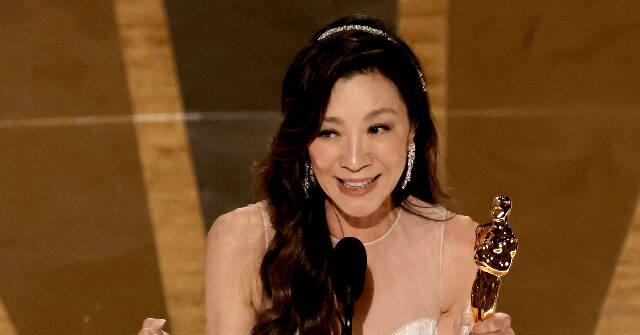Hu Xijin, a top Chinese propagandist and former editor of the state-run Global Times, triggered a torrent of ridicule Monday for crediting the “Chinese cultural genes” of actress Michelle Yeoh for her Best Actress Academy Award.
As the bombastic Hu’s detractors pointed out, Yeoh is not a Chinese citizen and the movie she won the award for is banned in China.
Congratulations to Michelle Yeoh! So happy for her. China is rising, and Asia is rising. People of Chinese descent and Asian descent will definitely receive more attention, gaze and respect all over the world.https://t.co/VQb5OSkTMp
— Hu Xijin 胡锡进 (@HuXijin_GT) March 13, 2023
As with other Chinese Communist apparatchiks and propagandists, Hu is inexplicably allowed to use Twitter even though his oppressive government bans ordinary Chinese citizens from using the platform. The Chinese public is forced to use Sina Weibo, a similar microblogging platform that is tightly controlled by the regime in Beijing.
In the longer version of the above post that appeared on Weibo, Hu added, “More people of Chinese descent will take advantage of that momentum and achieve new pinnacles. We should be cheering on anyone of Chinese descent who carries China’s cultural genes.”
Hu, a belligerent nationalist dubbed “China’s Troll King” by the UK Guardian during his salad days as editor of the Global Times, apparently did not bother to look at Yeoh’s genealogy before making his claim about genes.
Yeoh became a major movie star in Hong Kong before launching her career in Hollywood, but she is from Malaysia. She has Chinese ancestors, but as Radio Free Asia (RFA) pointed out on Wednesday, they got out of China long before Mao Zedong’s hideous Chinese Communist Party took over.
Many of the contemptuous responses to Hu’s weird claims needled him for trying to credit China for the success of a Malaysian actress, some were angry that anyone would try to muscle in on Yeoh’s great personal achievement, and many noted that her Oscar-winning film Everything Everywhere All at Once has not been released in China.
Many Chinese residents found ways to see the movie anyway and they seem very pleased with it. Hashtags on Weibo using the movie’s title have racked up millions of hits, especially when using the hilarious alternate title it picked up in Taiwan: F**king Multiverse.
Everything Everywhere All at Once has been banned outright in parts of the Middle East because several of the characters are gay. (Counting exactly how many gay characters are in the film is difficult, because, well, f**king multiverse.) The Chinese Communist Party has grown increasingly unfriendly to gay content in a time of demographic crisis, but it has many other reasons for banning foreign movies as well.
Journalist Cai Shenkun told RFA it was annoying to see Chinese state media, and its army of “little pink” nationalists online, rushing to take credit for everything accomplished by people of Chinese descent, especially when those achievements would not have been possible in the People’s Republic of China.
“There wouldn’t be so many outstanding people of Chinese descent if they hadn’t escaped that country, yet now they’re being claimed as Chinese,” he scoffed.
“This is particularly clear in the case of Michelle Yeoh. There is no way such a brilliant artistic achievement would be possible in China, where culture and ideas are all behind bars. They can’t train actors like her themselves, because art requires freedom of thought,” agreed commentator Lu Nan.
Hu actually came close to seeing his nationalist fantasies come true because the role she played in Everything Everywhere All at Once was originally offered to her old friend Jackie Chan, an avowed supporter of the Chinese Communist Party.
Yeoh told the UK Guardian in May that she teased Chan via text messages about losing the part to her:
The Daniels [co-directors Daniel Kwan and Daniel Scheinert] readily admit that if Yeoh had turned down the part, they would have had to start from scratch. They also admit, however, that their original idea was to make the husband the protagonist and to cast Jackie Chan, with Yeoh playing his wife. When Chan was unavailable, “something clicked”, the Daniels say, and they realised the story would work much better with the wife as the lead.
Chan and Yeoh are old friends; in fact, he was Yeoh’s first co-star, in a 1984 commercial for a Hong Kong watch brand. There has always been a competitive element to their relationship, it seems. “Jackie actually texted me,” she says. “And he says: ‘Wow, I hear amazing things about your movie. Did you know that the boys came to see me in China?’ And I said: ‘Yes, your loss, my bro!’”
Somewhere out there is a world where Jackie Chan, not Michelle Yeoh, beat up two guys who acquired superhuman kung fu skills by shoving trophies up their butts, and in that world, audiences were denied the second coming of Ke Huy Quan — because, you know, f**king multiverse.


